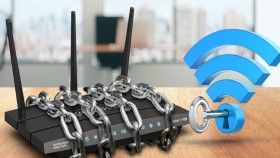Tips To Boost Your Internet Security
With so much advancement in technology, securing your data, devices, internet traffic, and identity is becoming very important. Otherwise, you can fall victim to cyber threats; this is why we are here to give you a few tips on how you can surf online more safely and help you boost your internet security.
Let's get started.
Five Ways To Boost Your Internet Security
Want to navigate online more securely? Follow these five easy steps to protect your internet security.
1. Use Strong Passwords

Do your device and personal accounts have passwords like "123456" or "12345678". If yes, you might be surprised to know that these are some of the most common passwords people use. So avoid using these instead; try using a unique passcode for every login.
It is ideal for making a combination of your username and password. Or use a random collection of numbers, symbols or letters, but usually, these passwords are pretty difficult to remember. To keep things simple, a good practice is that your password must contain at least one number or one symbol or uppercase letter in combination with whatever word you would like to use.
2. Keep Your Software & Applications Up To Date
First, never disable or uninstall your firewall as this is not a good option to go for and often do not work for many. Secondly, keep your software up to date no matter what because usually, an update is a company updating users about a security hole in their software.
Last, if you are not using any application or software, you should delete or deactivate it. All these steps are some of the best practices to boost internet security if you own a small business.
3. Do Not Use The Same Passwords Again
This is a very common password mistake that people usually make. Many applications and software will make you reset your password every few months to a year if they think your password or security is compromised.
If that happens to you, then never make the mistake of using the same password again. Additionally, do not use the same password for different accounts, either. Because if a hacker gets the password to your one account, this means they can quickly get access to your all accounts.
4. Backup Your data
If you have a small business, then doing this step would really help you in the long run, especially if any mayhem strikes. Use tools that allow you to keep your data safe and access it from anywhere whenever you want.
5. Secure Your Wi-Fi

Your private Wi-Fi network is essential to be encrypted, secured and hidden. And if you are using an unsecured Internet source like public Wi-Fi, consider using a private IP service to allow a secure connection.











